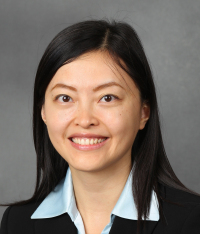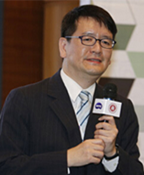
高菲
|
Title:Building Open and Connected Online Communities for Learning
Abstract:
The abundance of social, mobile and gaming technologies has led to the rise and thrive of socially situated and interest driven online communities. By offering opportunities for personalized, just-in-time, and lifelong learning, online communities are changing the ways that we acquire, share and use information to co-construct new knowledge. According to research, however, only the most active digital learners are taking full advantage of such opportunities. Educators and researchers have struggled to find ways to harness the benefits of this new form of learning. In this presentation, we will explore the potentials and opportunities offered by online communities, the challenges of getting learners engaged and immersed in communities of practice, the effective strategies to create thriving online communities, and the future trends in building open and connected online communities for learning.
Biography:
Fei Gao is an associate professor in Learning Design in the Department of Visual Communication and Technology Education at Bowling Green State University. She holds a Ph.D. in Educational Psychology and Educational Technology from Michigan State University. Her research is focused on understanding the nature of interaction and learning afforded by emerging technologies, and exploring how to make learning more efficient, effective and engaging by tapping into the capacities of these technologies. Most recently, her interest in online communities has led her to conducting in-depth analyses of these communities by using a combination of traditional research methods, text mining techniques and social network analysis. Her work has been published in peer-reviewed journals, such as, The Internet and Higher Education and British Journal of Educational Technology. In addition to serving as reviewers for multiple esteemed journals in the field, she is President-Elect of the Research & Theory Division of the Association for Educational Communications and Technology (AECT), and a member on the Board of Directors of the Society of International Chinese in Educational Technology (SICET). |

吴颖沺
|
Title: Technology-enhanced knowledge building pedagogies in science education:Collaborative learning with socio-scientific issues
Abstract:
In the 21st century, citizens of democratic societies have an increasing number of opportunities to encounter a variety of socio-scientific issues (SSIs), which are social dilemmas with conceptual or technological associations with science. To solve these SSIs, people have to share their understanding and work collaboratively. As SSIs are relevant to students and can bridge school science and students’ real-life experiences, they have been used to provide meaningful learning contexts in science classes. When implementing SSI-based science instruction, knowledge building pedagogies could be helpful for improving students’ learning. In this talk, Knowledge Building Theory will be introduced firstly. Also, the findings derived from a case study on applying knowledge building pedagogies in SSI-based science instruction will be reported.
Biography:
Dr. Ying-Tien Wu received his Ph. D degree in Department of Earth Sciences (major in science education) at National Taiwan Normal University (NTNU) in Taiwan. He is now an Associate Professor in the Graduate Institute of Network Learning Technology at National Central University in Taiwan. Dr. Wu’s research work involves both science education and educational technology, and his research interests include inquiry-based learning, scientific reasoning and argumentation, knowledge building pedagogies, the use of gamification in education, technology-enhanced learning, and technological pedagogical content knowledge (TPACK).
Before his service in university, Dr. Wu had eleven years of elementary science teaching experience which benefits him for transforming educational theories into practice. He is keen to help teachers in practice to improve their teaching practices. His lab has also developed several online learning systems or platforms helping learning and teaching from elementary school to high school.
His research findings have also been published in reputable international journals in science education and digital learning, such as Science Education, International Journal of Science Education, Research in Science Education, Journal of Computer Assisted learning, and Educational Technology and Society. Except for being the associate editor for two influential academic journals, Dr. Wu also serves as the editorial board member or the reviewer for many influential academic journals in science education and educational technology. Owing to his outstanding research performance, Dr. Wu received the Ta-You Wu Memorial Award (Young Outstanding Researcher Award) from the National Science Council in Taiwan.
|

Prof. Jin-Hyouk Im
|
Title: MOOC-enabled Flipped Learning
Abstract:
Two major challenges for higher education are (1) improving quality and (2) reducing cost. Korea had been very successful in developing her economy by being a fast follower up until recently. Nowadays, however, it’s been trying to be a first mover by pursuing a creative economy. Universities are under pressure to equip students with creative talents such as problem-solving, critical thinking, collaboration, communication skills. On the other hand, they have been barred from raising their tuitions for four years in a row, thus suffering from financial hardships. Flipped learning (FL) and Massive Open Online Course (MOOC) are emerging as two promising alternatives to the traditional learning model of lecture-oriented passive learning. FL is mainly to deal with the first challenge of quality improvement while MOOC with the second one of cost reduction. There are rising interests in FL and MOOC in Korea, too. FL and MOOC originated as two different things with no common ground. However, it seems that there is a great potential for synergic effects when the two are blended for MOOC-enabled FL. UNIST’s experiments on this will be shared.
Biography:
Professor Jin-Hyouk Im holds a Ph.D. in Management Information Systems from the University of Nebraska-Lincoln. He has been interested in disruptive innovation in education for quality improvement, yet cost reduction. He pioneered the idea of IT-enabled active learning in Korea by flipping his classroom in spring 2009 when his institute, Ulsan National Institute of Science and Technology (UNIST), opened. Upon his success, he became instrumental in flipping over 100 courses (25%) in UNIST. Thanks to his long experiences in FL, he has delivered more than 100 speeches on disruptive innovation in education with MOOC and FL. Currently, he has been experimenting several different MOOC-enabled FL courses for synergic effects.
|
|

Dr. Lijie Lin
|
题目: 翻转课堂与XAPI学习数据分析
Abstract:
全球教育领域发展如翻转课堂(Flipped Classroom)等创新教学模式,教师在课堂中,扮演的不再是传统「知识传递者」的角色,而进一步成为「学习的引导者」(facilitator),转换成学生为学习的中心(Learner-centered)的学习模式,学生透过亲身参与、深度思考、沟通讨论来深化知识、提升学习的成效,同样也在这过程中培养了沟通协调、表达、合作、批判思考、创新创意等高层次的软性能力。因为教育科技的同步发展,因应网际网络、行动应用、数位汇流…等趋势,此领域也逐渐诞生许多更有效的工具,例如:在线 MOOCs 影音学习平台(Coursera, Udemy, Khan Academy…等)、游戏式学习平台(PaGamO)、课中教学互动系统(TronClass…等)…等,进一步支援教师、学生在翻转课堂新模式下运作,降低翻转课堂的进入门槛、更进一步提升其运作的效率。而这当中,教育数据的学习分析(Learning Analytics)将成为其中不可或缺的重要一环,这些在线的学习活动皆能够透过网际网络的成熟科技,针对教师的教学行为、学生的学习历程行为进行有效的纪录,累积大量的数据、提供作为学习分析的重要基石。
Biography:
Dr. Lijie Lin graduated from Taiwan’s Hsinchu Jiao Tong University, and obtained the master’s and doctorate in computer science from the University of New York. During the graduate studies, he developed a worldwide first learning management platform Web Based Learning Management System. Dr. Lin worked at the IBM Watson research center as a researcher and was responsible for the design of Web-Based Healthcare Management System. In 1997, Dr. Lin returned to Taiwan and built an Internet company VISIONARY, which is one of biggest portal site in Taiwan as KIMO. From 2000 to 2003, Dr. Lin took a place as a researcher and visiting professor in the computer institute of Chinese Academy of Sciences (CAS) and Shanghai Jiao Tong University. During this period, Dr. Lin participated in the national high technology research and development program of China, namely 863 programs, and focused on the research and development of the standard specification for e-commerce technology in China.
|